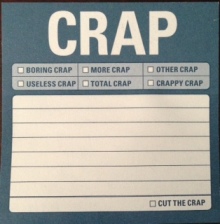You have the 10 best of this, the five most important of that, the 25 essentials of the other thing.
I understand why there are so many lists out there. They’re easy to create and share. They offer fast insights at a glance. They’re actionable and can drive traffic. They’re good for SEO.
I get all that.
But lately, I’ve found there’s an overabundance of lists for those very reasons noted above.
Some are really good and offer value. But like infographics, the general quality of lists seems to be decreasing in direct proportion to the volume produced.
Or maybe my standards are just getting higher.
So at the risk of adding to the clutter, here’s one more list from me – listing the reasons I’m getting tired of lists:
1. Too many are dashed off without enough research, work and forethought (and yes, this might be an example 🙂 ).
2. They could use more curation. When I see 30 of something, I wonder why people don’t use their editorial skills and make some tough choices.
3. They’re too disposable – the junk food of content. A half-hour after you’ve consumed one, you’re hungry for another.
4. They should be done by five suggestions (or at most a Letterman-style top 10). That’s why I’m stopping at four.
I’m not giving up on lists completely and certainly not my to do or wish lists. But it’s going to take more than a zippily numbered headline to make me pay attention and share.
What do you think? Feel free to start another list pro or con in the comments.


I think readers often are more quickly inclined to click on a “list link” because they know they may be able to scan it more quickly in order to determine if it’s useful (?) – I know that’s the case for me. When I write a post for 12Most, sometimes there are so many options it’s hard to narrow it down to 12 (like the 12 most supercilious corpspeak terms!) and other times that it’s a stretch (like my post about comparisons between sandcastles and business). A good reminder that no matter how we construct our posts, quality content trumps catchy teasers every time.
biggreenpen Thanks Paula! You’re so right when you say it’s quality that’s the most important. You know, I do like some list posts and share them and had to take a bit of a moratorium after I wrote this. But now I’m back with them – just curating a bit more :).
I confess that I like to read (and to write) lists. Short lists, though! Easy to read, but not always easy to write if you do your research and edit yourself.
Thanks DonnaPapacosta. I know what you mean. It’s always a lot more difficult to harder to write short and succinct – the less words, the more time.